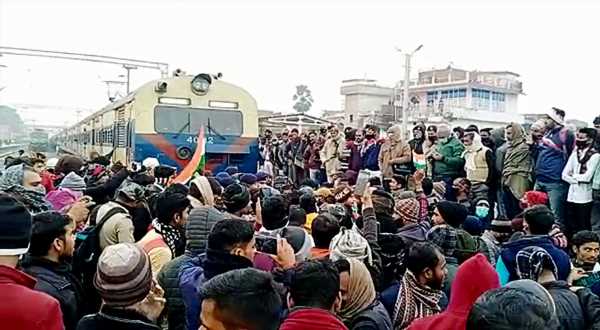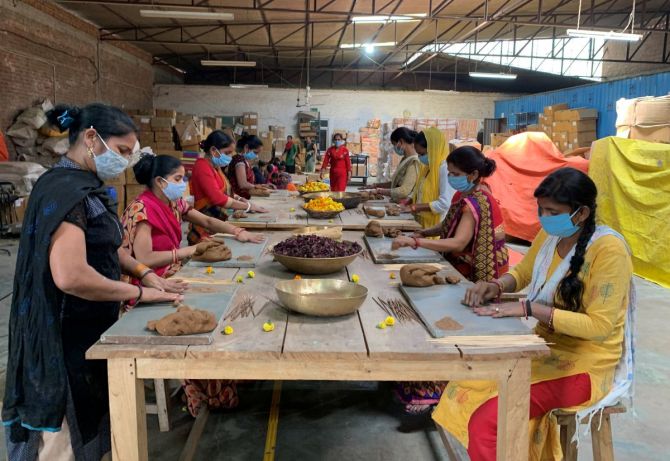‘In May 2020-2021, nearly 10 crores (100 million) lost jobs.’
‘Covid is not the reason for the present crisis. It aggravated the crisis.’
Ahead of next week’s Budget 2022-2023, economist Dr Bhalchandra Mungekar, a former member of the Planning Commission, discusses the the state of the economy and the challenges ahead with Rediff.com Senior Contributors Sunil Gatade and Venkatesh Kesari.
Dr Mungekar, a former vice chancellor of Mumbai University, was a nominated member of the Rajya Sabha. The concluding segment of a two-part interview:
- Part I: ‘People have realised Modi’s capacity to deliver the goods is exhausted’
How do you look at the growing price spiral and the rising unemployment? Is there no rainbow at the end of the tunnel?
Unemployment is unprecedented. India is facing unemployment due to two main reasons.
One was the demonetisation carried out in 2016 it was absolutely as Dr Manmohan Singh had mentioned ‘legalised plunder and organized loot’.
I would say that demonetisation was the most irresponsible decision any prime minister or head of the nation has taken and it has seen an economic deceleration in the last four years.
The situation was accentuated by Covid, but Covid is not the reason for the present crisis. It aggravated the crisis.
In May 2020-2021, nearly 10 crores (100 million) lost jobs.
The government does not release any statistics as was done by the Labour Bureau earlier.
One is made to depend on the data supplied by CMIE.
22 crore (220 million) people were pushed below the poverty line.
In September 2021, 8.32 percent was the rate of unemployment which by any standard is higher. In August alone 15 lakh (1.5 million) people lost jobs.
Unfortunately, there is no integrated vision in the present government to visualise the problems and come to the best possible solution.
This government is not working as a team unlike in the UPA… I see no rainbow…
Prime Minister Modi insists that with the country doing a record 100 crore (1 billion) Covid jabs, the economy is improving fast, FDI is moving in fast and other parameters are also showing growth.
How do you see the state of the economy?
The entire economic and political power is concentrated, regrettably, in the hands of the prime minister and the home minister.
It is bad for the ruling party itself and it is so for the nation.
In September 2008 during the global financial crisis, the entire world economy collapsed except India and China.
China then grew 9 percent and India 6.3 percent.
The most important reason for this was that Prime Minister Manmohan Singh, the economic advisory committee, Pranab Mukherjee, and most importantly, the Planning Commission (worked together).
It was a collective decision that nationalised banks increase the money supply to accelerate the demand that saved the economy from disaster.
As against this, at present, there is no coordination. No one knows who takes the decision.
Because the BJP is the ruling party and I am not in favour of the BJP, I will not celebrate the BJP’s failure, but why is there no coordinated thinking?
Why is there a crisis of thinking about the management of the economy?
First, you have to identify the problem.
If they hide the real problem facing the nation under the carpet, how would they come to a solution?
There are stalwart economists and policymakers in the country, but the ruling party is totally averse to them.
The government should call a round table conference of independent economists and policymakers and benefit from their knowledge.
These experts may not be subscribing to the ruling party’s policies and programmes, but they are not anti-nationals and traitors.
Whatever suggestions they might give might not be acceptable, but what is wrong with understanding their views?
The biggest wrong decision of the Modi government was the abolition of the Planning Commission.
It was an absolute blunder. It was non-constitutional, but still, it was a genuine think- tank and correcting factor (that brought about) correctives.
It was a countervailing power. Whatever the government will do was examined by the Planning Commission even though its opinion was not binding on the government.
Where has Modi failed in his economic management? Before becoming PM, he used to project that he was a reformist leader.
How, according to you, can Modi tide over the situation?
The crisis is not over. If the government does not accept that the crisis is still there and finds the appropriate solution, it may further deepen.
In the last 15 years, the manufacturing sector is constantly stagnant which is job producing… effecting job production… The FDI we are getting is peanuts as compared to that of China.
Besides, such a large economy cannot be merely dependent on FDI.
You have to increase your domestic rate of saving which is at present 30 percent.
The highest saving rate of 35 percent was in 2012.
Before coming to Delhi, Modi created hype for the Gujarat Model. It was a myth, which naturally exploded.
Management of the economy since 2014 is in chaotic condition because all economic decisions are taken on an ad hoc basis.
You can see the ad hocism even in the decision to reduce taxes on petrol and diesel after reverses suffered by the BJP in a series of assembly by-polls.
The reduction done by the government is peanuts.
What ‘New Deal’ would you suggest to help retrieve the situation?
A. The prime minister’s top priority should be the development of the MSME sector which contributes 45 percent of the national income and 75 percent employment. It has not been given its due importance.
B. In India, 80 percent of farmers are small farmers having less than two hectares of land. Top priority should be given to make small farming viable. He is not at all thinking or talking about making small farming viable.
C. Much larger investment in health and education. Today the investment is just peanuts — 3.9 percent of GDP on education and approximately 3 percent on health. We are talking of building social capital with such peanut amounts.
D. I am totally opposed to the Rs six lakh crore of monetisation of public assets.
This sale and buyback policy will be absolutely erroneous because big crony capitalists will be purchasing those assets and the banks will be giving loans to them for this purchase.
It means crony capitalists will be using public money to buy public assets. It will be a tragedy.
E. MNREGA (The Mahatma Gandhi National Rural Employment scheme) needs to be further strengthened and it should also be introduced in the urban areas.
Despite so much distress all around, why do you think that the issues of bread and butter, jobs and livelihood, social justice, and equity have not taken the centre stage so far?
Why do economic issues not influence polls where caste, community, and welfare programmes aimed at some sections help in getting votes?
I feel there is tremendous discontent among the people about the ruling dispensation.
People are convinced that the prime minister is giving only slogans and not trying to fulfill them.
The government is horrendously misusing the institutions such as ED, CBI and others, not only to crush dissent, but imprison some of them.
There is a general perception that the government is revengeful and that is why people do not come forward.
Besides, the inability of the Opposition parties to mobilise this discontent.
According to me, as a critical evaluator of the present government’s performance during the last 7 years, I am of the considered opinion that the Modi government is surviving not because of its ability to survive, but inability of the Opposition to counter the government.
Still, people are not coming to the streets as they used to do earlier because of inability of the Opposition parties.
Feature Presentation: Aslam Hunani/Rediff.com
Source: Read Full Article

